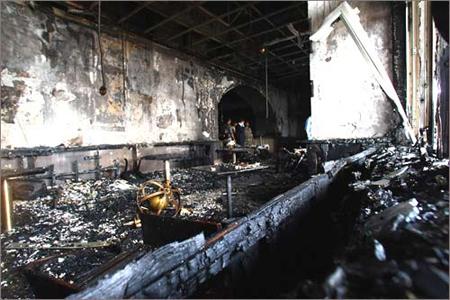 | « Back to article | Print this article |
Lessons from Kasab for the financial sector
Abu Jundal is the latest hot property in terror-related news in India. Newspaper reports are replete with stories of how intelligence agencies are gleaning more information from him.
The Mumbai Police took credit pointing out how its interrogation of Ajmal Kasab the lone-surviving gunman who killed many during the 26/11 terror attacks in the city, led to Jundal.
When Kasab had been apprehended in 2008 right after the attacks, many joined the chorus for hanging him without trial. Even some leading senior counsel had called him a "prisoner of war" and called for his immediate execution, without giving him benefit of a trial.
Anyone who called for slowing down and giving him a trial was treated by many as a sympathizer of terror, or as worthless peacenik.
Click NEXT to read more...
Lessons from Kasab for the financial sector
Had Kasab been executed then without trial, or had not been captured alive (thanks in no small measure to a police constable who wrestled the gun-toting terror suspect to ground, giving up his own life in the process) perhaps one would not have been able to piece together the Jundal story.
Jundal, in turn, would lead to others, as the probe through a very complex and a highly-efficient terror operation, proceeds.
There is a parallel lesson from this for the financial sector. Often, regulators announce having come across grandiose and a complex conspiracy of financial sector fraud. However, often a piece-meal approach is adopted in the investigations.
One or a section of the conspirators is held guilty through a summary process under equivalents of anti-terror legal provisions (for example, Sections 11 and 11B of the SEBI Act) to pass orders against anyone the regulator feels is guilty of the misconduct.
Click NEXT to read more...
Lessons from Kasab for the financial sector
Had Kasab been executed then without trial, or had not been captured alive (thanks in no small measure to a police constable who wrestled the gun-toting terror suspect to ground, giving up his own life in the process) perhaps one would not have been able to piece together the Jundal story.
Jundal, in turn, would lead to others, as the probe through a very complex and a highly-efficient terror operation, proceeds.
There is a parallel lesson from this for the financial sector. Often, regulators announce having come across grandiose and a complex conspiracy of financial sector fraud. However, often a piece-meal approach is adopted in the investigations.
One or a section of the conspirators is held guilty through a summary process under equivalents of anti-terror legal provisions (for example, Sections 11 and 11B of the SEBI Act) to pass orders against anyone the regulator feels is guilty of the misconduct.
Click NEXT to read more...
Lessons from Kasab for the financial sector
Such varying evidence, even while supporting the need for regulatory intervention, could show that the quantum and scale of intervention adopted by the regulator was misplaced.
It is at this point that the regulator is faced with a moral dilemma. If it were to admit to the error, it could jeopardize its credibility. If it does not admit to the error, it could inflict enormous injustice but save its public face. Invariably, the latter is opted for.
There are indeed instances where one of the accused in a financial fraud conspiracy is before the an even higher court in appeal against the appellate body's decision in an earlier case against one section of conspirators, even while the appellate body itself has been presented with gross errors by the next set of conspirators, which cannot be reconciled with the story presented until then.
Click NEXT to read more...
Lessons from Kasab for the financial sector
At times, the second or third round of cases get remanded, asking the regulator to come up with more specific findings and reconciling blatant and irreconcilable versions of the different stories on which earlier orders of the regulator were sustained.
At other times, appellate courts too could get tired and go with the societal blood-thirst of upholding the guilty orders, morally convincing themselves that the "after all these are bad guys who are being punished".
That is when the rule of law completely breaks down.
Click NEXT to read more...
Lessons from Kasab for the financial sector
In fact, it could lead to a horrible wrong-doer getting away with a light sentence with someone who has been more sinned against than sinned, being punished severely and disproportionately.
Regulators would do well to learn from how it was prudent for the larger system of the rule of law to not fall to societal blood-thirst in the case of Kasab.
Picking on one set of conspirators and punishing them without completing the entire picture, or cutting corners when faced with new facts and developments, erodes the credibility of the system, and breaks down the rule of law.<hr>
(The author is a partner of JSA, Advocates & Solicitors. The views expressed herein are his own.)






